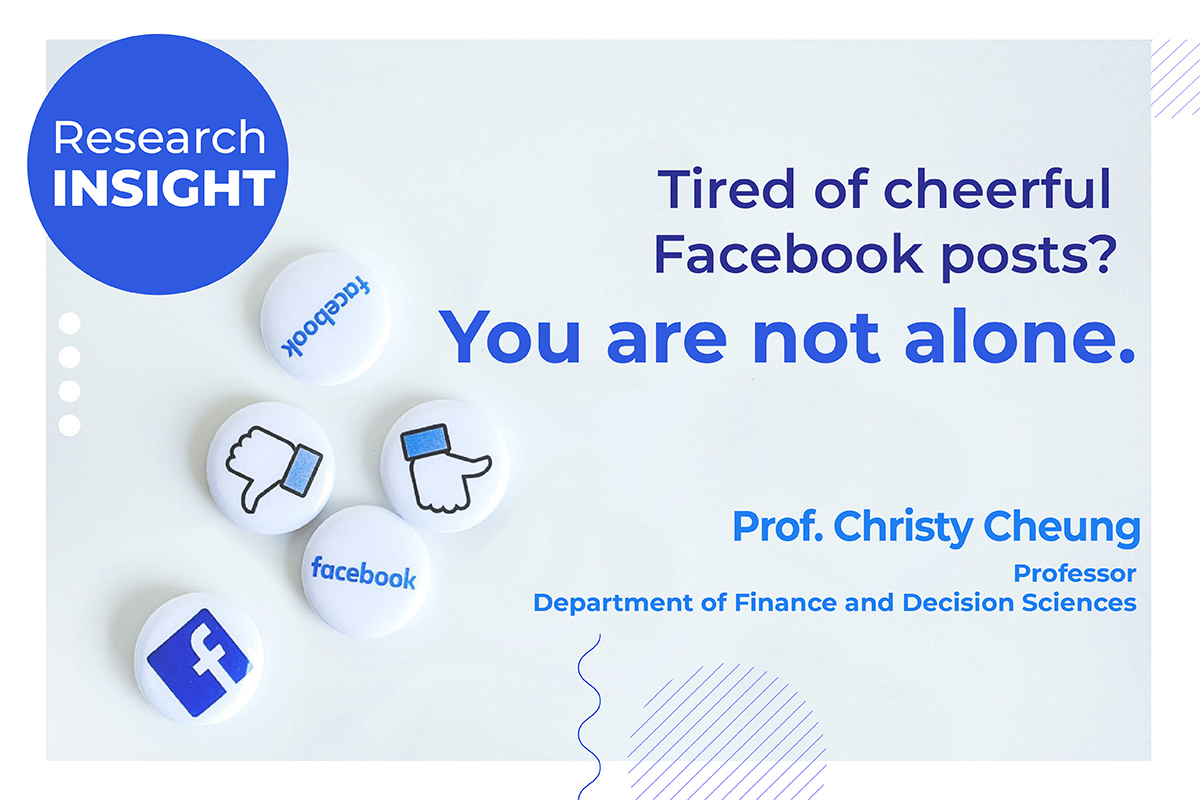School of business - research
Tired of cheerful Facebook posts? You are not alone


We all know about the beautiful lives of our Instagram and Facebook “friends”. From fancy meals in Michelin restaurants to jetting off to exotic beach paradises, it seems everyone but us is living the dream! Yet, as social network users showcase an unabashedly upbeat image of their lives, it seems we become envious and start doing the same, triggering an endless loop of upward social comparisons and envious feelings that is eroding the atmosphere of Social Networking Sites (“SNSs” ).
In a recent research paper1, Prof. Christy Cheung of the Department of Finance and Decision Sciences and researchers identify three behavioral strategies – self-enhancement, gossiping and discontinuous intention – and investigated how users of Facebook –a leading SNS– in Germany and Hong Kong adapt these strategies to cope with their envious feeling. Defined as a painful emotion triggered by an unfavorable upward comparison with someone who possesses something we desire but don’t have, envy is a negative emotion we feel as inequity. Striving to feel better, we are compelled to try to reduce the gap with those we envy.
On SNS, we share socially desirable, carefully selected, positive information about ourselves (i.e., self-enhancement) as a way to promote ourselves and “level-up” with those we envy, while we gossip or even engage in cyberbullying in an effort to bring them down. Some of us even discontinue the use of an SNS as a resolution to stressful social exposures. Given culture plays an important role in how individuals cope with envy, it was expected that people from a more individualist culture (in this case Germany) would privilege self-enhancement and avoidance, while those from a more collectivist culture (Hong Kong) would be more likely to resort to gossiping.
Findings demonstrate that Facebook users from Germany and Hong Kong engage in all three strategies to cope with envy on SNSs. Yet, that while users from Germany – the individualistic culture – are indeed more prone to use self-enhancement, users from both Hong Kong and Germany appear to equally use gossiping and avoidance to deal with envy.
The research suggests that beyond provoking negative emotions, envy triggers the use of coping strategies that have a corrosive impact on SNSs. While self-enhancement is generally benign, gossiping can lead to cyberbullying, an increasing problem. Meanwhile, users tired of trying to keep up with the lifestyle standards set by their online peers may simply decide to close their account. SNSs should thus seek to reduce exposure to envy-provoking content while doing more to understand how envy impacts their activities.
The study also carries some lessons for ordinary users like us: let’s try not to feed the cycle by exaggerating the good aspects of our lives and talking badly about others online!
Reference:
1 Wenninger, H., Cheung, C., & Krasnova, H. (2019). College-aged Users Behavioral Strategies to Reduce Envy on Social Networking Sites: A Cross-cultural Investigation. Computers in Human Behavior, 97, 10-23.